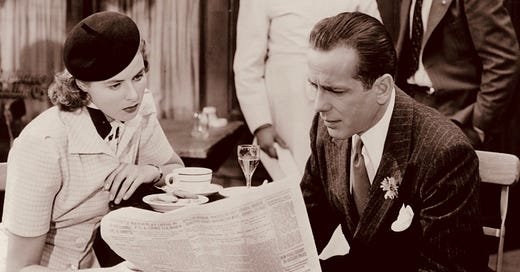Casablanca Close Up (‘Play it, Sam’ Sequence)
Overview:
The sequence begins with Rick drinking in his empty cafe with Sam, who he asks to play As Time Goes By. As the camera pushes into Rick there is a long crossfade edit to Paris, where he reminisces about his time with Ilsa at all the cliche Paris date spots (driving by the Arc de Triomphe, driving in the French countryside, taking a boat trip down the Sienne, sitting in a cafe with a beret on- you get the gist.) It suddenly turns dark when they first read of the Nazi threat in the newspaper, and then a radio broadcast from outside the bar where Rick day drinks champagne alerts the Parisians that Nazi occupation could take over in less than a day. Rick and Ilsa plan to take a train south away from Paris, and agree to meet at two later that afternoon. There is a cut to Rick at the station and Ilsa is nowhere to be found, but Sam had found a letter from her along the lines of “I love you but can’t go with you, sorry!’’ As the ink on the paper washes away Rick is forced to leave Paris without her. This then crossfades back to him dropping his glass, and looking more miserable than before.
Key Elements:
This sequence is the only part of the film that isn’t shown through continuity editing. The analepsis starts with a very dragged-out cross face clearly signposting that this segment will be a flashback. Then to make the location as obvious as possible the visuals fade back in with a hazy arc de triomphe as La Marseilles plays into the non-diegetic score.
There is then another cross fade to a shallow focus two shot of Rick and Ilsa in a convertible car driven through Paris. In an incredibly cliche montage, the back projection then changes to the French countryside as the non-diegetic score turns more bucolic. Then through a crossfade they are in a wide shot on a boat on the Seine in front of the Eiffel Tower, then again dancing at a ball with Rick in his suit and Ilsa in a silky dress that is clearly familiar Hollywood glamour.
Suddenly the romanticism is shattered by imposed wartime footage, and then into the streets of Paris where the camera movement is more erratic and moves through the crowds to Rick and Ilsa at a cafe reading in a newspaper while listening to the broadcast. There is a mix of French and German, but using understandable words (oppositions, demain, capitale etc.) Then through exposition Ilsa brings up how Rick can’t stay on Paris because of his ‘record.’
Then, finally, the sequence is contextualised with a tilt up from the shadow of the “La Belle Aurore” on the floor to a wide shot of the cafe Rick named earlier in the film. The camera pushes in tracking Rick who walks from to bar to Sam at the piano (who, you guessed it, is singing as time goes by.) Rick has clearly been influenced by Ilsa, and unlike the rough masculine man of the future, here he wears a flower in his lapel and looks at her softly. There is then another off screen radio message in German, and the pair rush to the window as the camera pans around them. Ilsa translates, as there’s a shot reverse shot to the street, that the Germans are a day away from Paris.
Through a typical shot reverse shot conversation, it is revealed that Rick is wanted for his involvement in the Spanish Civil War, and then the dialogue turns to the cliche “we chose this time to fall in love?’ discussion. Rick suggests them meeting at the station later than day and getting married on the train, but Ilsa’s disillusioned reaction is over reactive and clearly signalling that isn’t going to happen.
There is then a penultimate crossfade to the station where Rick stands drenched in the rain in his typical Humphrey Bogart noir uniform of tench coat and fedora. When Sam hands over the letter, there is a very intentional close up just long enough to read the whole thing, and then see the rain running down it definitely evoking crying imagery. The analepsis ends with another flashback, this time to Rick’s glass as he drops it on the table.
Context, Representation, Auteur:
German occupation of Paris started on the 14th June 1940, over a year before US involvement in December 1941 which is why the pro-allied feeling is so strong in this segment of the film.
Ricks “here’s looking at you kid” wasn’t scripted but rather something he said to Bergman on set that just stuck- it’s said three times in this sequence.



